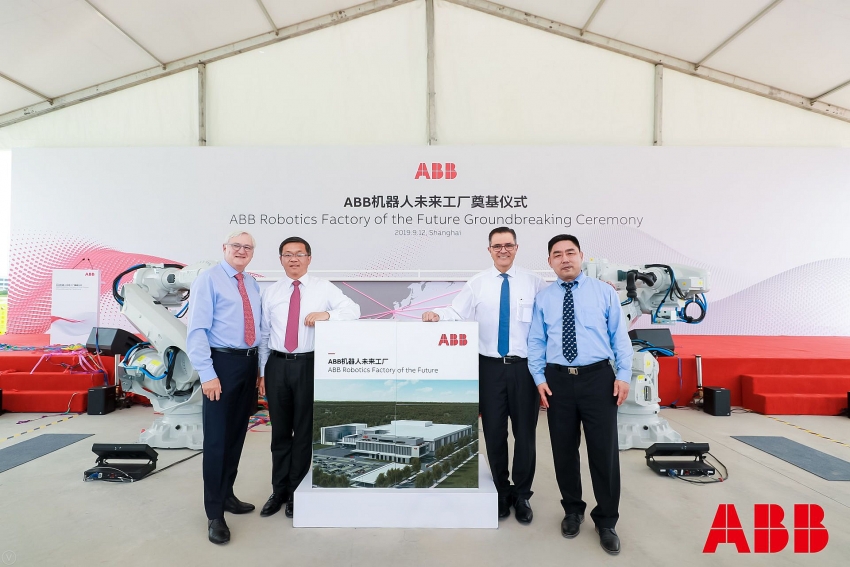ABB breaks ground on its advanced robotics factory in Shanghai
 |
| The new ABB facility will employ robots – to build robots |
The new 67,000 square metre factory in Kangqiao, near Shanghai, will deploy the latest manufacturing processes, including machine learning as well as digital and collaborative solutions. It will be the most advanced, automated, and flexible factory in the robotics industry worldwide – a center where robots make robots.
The new factory will also host an onsite research and development centre, which will help accelerate innovations in AI. The center will serve as an open innovation hub where ABB closely collaborates with its customers to co-develop automation solutions that are tailored to their individual needs.
ABB’s robotics solutions serve a diverse customer base in Asia, supporting automotive manufacturers, particularly in e-mobility, as well as manufacturers in the electronics, food and beverage, pharmaceuticals, logistics, automation, and general industries, among many others. ABB predicts that global robot sales will grow from $80 billion today to $130 billion in 2025. China is the world’s largest robotics market; one of three robots sold globally in 2017 went to China.
Peter Voser, chairman and CEO of ABB, said, “The establishment of the new factory is another milestone in ABB’s development in China and will further strengthen our leadership in the world’s largest robotics market. Since the project was announced in last October, we have been provided with tremendous support from the local government. It has been listed among the Top 10 projects of the Manufacturing in Shanghai initiative in 2019, which is a great honor for ABB.”
Production in the highly automated factory will be based on cells of automation rather than on a fixed assembly line, which will allow robots to move from station to station for greater customisation and more flexibility than in traditional, linear production systems.
Automated guided vehicles (AGVs) will deliver parts to the production robots just in time, while the latest collaborative technologies will ensure that humans and robots can work safely side by side, bringing greater flexibility and agility to production processes and combining the advantages of robots with the unique capabilities of people.
The factory will be a complete digital manufacturing ecosystem, employing a ‘digital twin’ that will give everyone from managers and engineers to operators and maintenance teams data insights and machine learning capabilities to improve performance and maximise productivity. ABB will use a machine learning-based system to inspect robots as they are being assembled to ensure the highest quality standards.
ABB Robotics has three factories worldwide: the new factory in Shanghai, which will replace the existing one there, will support customers in Asia. The factory in Västerås, Sweden supplies customers in Europe, and the Auburn Hills factory in Michigan supports the Americas.
ABB has a full range of business activities in China – its second-largest market – including R&D, manufacturing, sales, and services. It has approximately 20,000 employees located in 131 cities and at 44 local companies. In China, the company’s robotics business employs more than 2,000 engineers, technology experts, and operational leaders in 20 locations across the country. ABB has invested more than $2.4 billion in China since 1992.
What the stars mean:
★ Poor ★ ★ Promising ★★★ Good ★★★★ Very good ★★★★★ Exceptional
Related Contents
Latest News
More News
- SK Innovation-led consortium wins $2.3 billion LNG project in Nghe An (February 25, 2026 | 07:56)
- THACO opens $70 million manufacturing complex in Danang (February 25, 2026 | 07:54)
- Phu Quoc International Airport expansion approved to meet rising demand (February 24, 2026 | 10:00)
- Bac Giang International Logistics Centre faces land clearance barrier (February 24, 2026 | 08:00)
- Bright prospects abound in European investment (February 19, 2026 | 20:27)
- Internal strengths attest to commitment to progress (February 19, 2026 | 20:13)
- Vietnam, New Zealand seek level-up in ties (February 19, 2026 | 18:06)
- Untapped potential in relations with Indonesia (February 19, 2026 | 17:56)
- German strengths match Vietnamese aspirations (February 19, 2026 | 17:40)
- Kim Long Motor and AOJ Suzhou enter strategic partnership (February 16, 2026 | 13:27)

 Tag:
Tag:


















 Mobile Version
Mobile Version